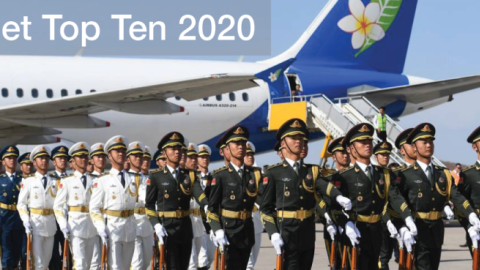p(firstLetter). American policymakers have long assumed that Chinese and American goals in the Middle East are largely complementary. Beijing, so the prevailing wisdom holds, is fixated on commerce, with a special emphasis on oil and gas. “China’s strategy in the Middle East is driven by its economic interests,” a former senior official in the Obama administration testified last year before Congress. “China … does not appear interested in substantially deepening its diplomatic or security activities there.” According to this reigning view, China adopts a position of neutrality toward political and military conflicts, because taking sides would make enemies who might then restrict China’s access to markets.
This oft-repeated shibboleth ignores clear signs that China is very actively engaged in a hard-power contest with the United States—a contest that the Chinese occasionally acknowledge and are capable of winning. In 2016, Xi Jinping toured the Middle East for the first time in his capacity as president of the People’s Republic of China, visiting Saudi Arabia, Egypt, and Iran. Chinese propaganda hailed the trip as a milestone. The Chinese Foreign Ministry issued a white paper on its Arab policy, the first of its kind. “We will deepen China-Arab military cooperation and exchange,” the paper read. “We will … deepen cooperation on weapons, equipment and various specialized technologies, and carry out joint military exercises.”
The following year, in 2017, the Chinese navy opened a naval base in Djibouti, the first overseas base it has ever established—a tacit renunciation of the traditional Chinese credo of noninterventionism. Djibouti sits on the southern end of the Bab-el-Mandeb Strait, which guards the passage to the Red Sea and the Suez Canal from the Gulf of Aden. On the northern end, only 18 miles away, lies Yemen.
China is advancing on the Middle East with ruthless determination, because the region is of more vital interest to China than any other, aside from the Western Pacific. Indeed, China is actively working to oust the United States from the Middle East—a reality that the American strategic community would overwhelmingly prefer not to recognize, but one that is nonetheless becoming glaringly obvious.
Don’t believe us? Ask the Uighurs, the brutalized people of Xinjiang province, which the Chinese government is actively colonizing by moving in millions of ethnic Han Chinese. The lucky among the Uighurs, who number some 11 million in total, are trapped in an inescapable web of surveillance and oppression. The unlucky ones, numbering perhaps 1 million, are interned in ideological indoctrination camps where they are exploited as slave labor, tortured, and, according to recent reports, subjected to forced sterilizations
What motive can China have for its ongoing torment of a small ethnic minority, which brings Beijing an ongoing avalanche of negative publicity in the West? Xi’s policy flows, the experts tell us, from Beijing’s fear of terrorist and separatist movements among the Uighurs, who are a Turkic Muslim people with ethnic and religious ties to their neighbors and to Turkey. Whatever the validity of this analysis, it misses the strategic vector, which again points directly to the Middle East.


















